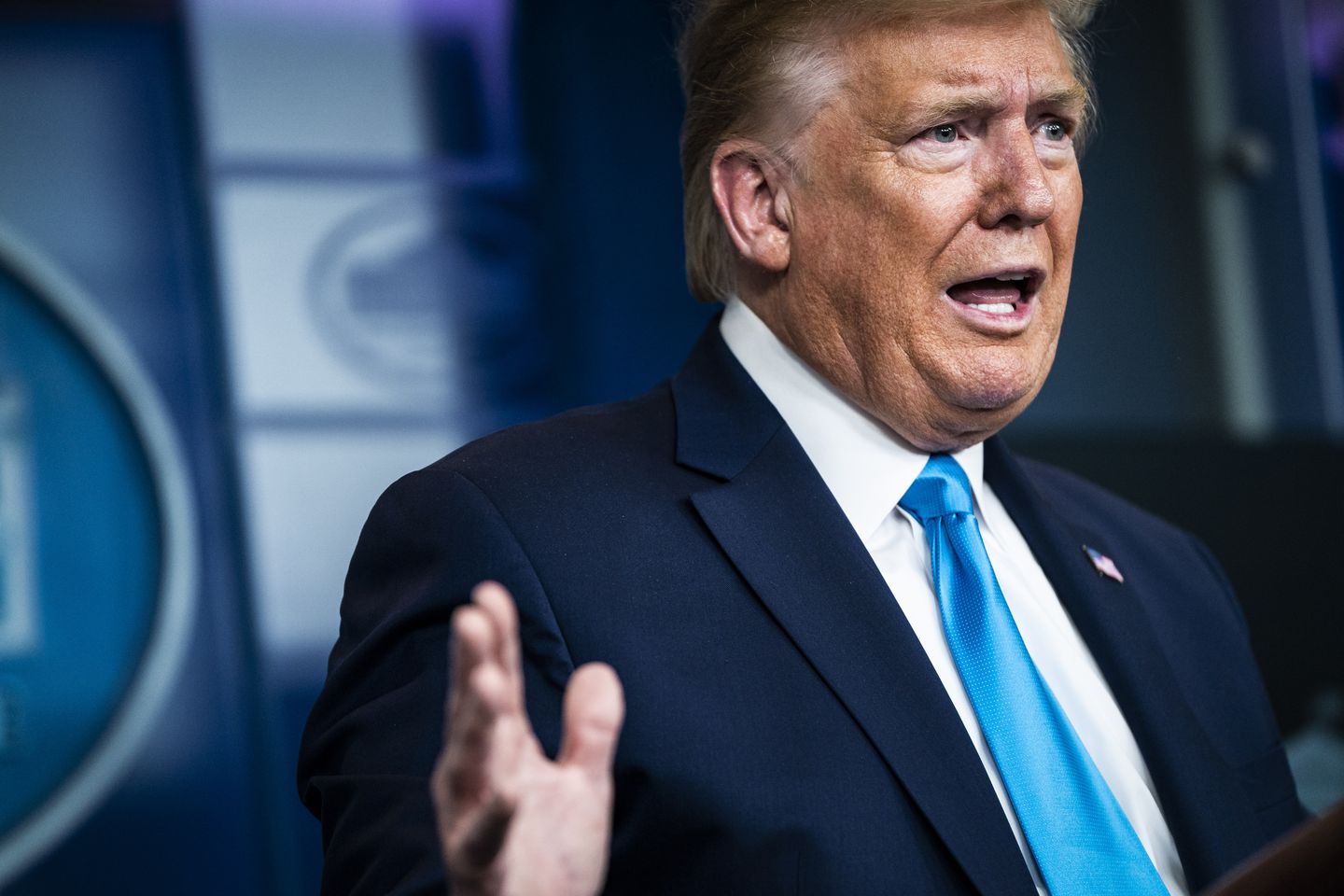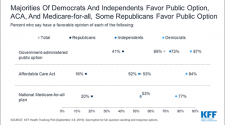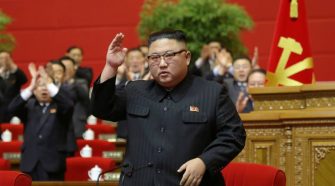Those characteristics have had a pervasive effect on the administration’s handling of the crisis, from Trump’s suggestions that he might withhold aid from struggling state governments based on whether he is displeased with a governor to his repeated refusal to take responsibility for shortcomings in the laggard federal response.
John Feehery, a Republican strategist, said that he’s never worked with a politician who enjoys criticism, but what’s unusual about Trump “is that he’s willing to counterprogram. He’s willing to go on the offense on a continuous basis.”
“He’s saying the quiet part out loud,” Feehery said.
Trump’s daily coronavirus news conferences — as much public health forums as presidential showcases — offer a vivid case study.
On Monday, for instance, Trump was asked about a new report by Christi Grimm, the top official in the Department of Health and Human Services’s Office of Inspector General, which found hospitals faced significant testing and medical supplies shortages.
The president first demanded the inspector general’s name and when she was appointed. He hinted that perhaps “politics” entered into her findings — though the Office of Inspector General is an independent entity specifically designed to ferret out waste, fraud and abuse in government, with minimal partisanship.
Informed that Grimm was appointed to her current role in January but is a career bureaucrat who previously served in the Obama administration, Trump lashed out at ABC News’s Jonathan Karl, who had pressed him on the report’s damning findings.
“You are a third-rate reporter and what you just said is a disgrace, okay?” Trump said, adding, “You will never make it.”
David Axelrod, a former senior adviser to President Barack Obama, said the president expects nearly everyone around him to do his personal bidding, a view both “childish” and “dangerous.”
“Trump demands affirmation and does not tolerate oversight from the media, Congress, even inspectors general who he appointed,” Axelrod said. “He wants to impose his version of events and discredit and disable any arbiters of fact who might disrupt his self-aggrandizing story line. That has been his instinct in business and politics, and we see it on full display in this crisis.”
Throughout his term, Trump has frequently singled out other organizations and individuals whose goal is to be objective — from intelligence and federal law enforcement officials to public health experts and judges.
His relationship with the Justice Department’s top law enforcement official is one example. He faulted his first attorney general, Jeff Sessions, for not sufficiently protecting him against special counsel Robert S. Mueller III’s Russia investigation, publicly tormenting him for months before finally firing him.
The media has also been an enduring target of Trump’s ire. At nearly every coronavirus news conference in recent days, the president has clashed with reporters — at times seemingly intentionally — dubbing the press “fake news” and criticizing the tone and content of their questions.
Especially amid the deadly pandemic, Trump has upbraided reporters, not just for tough questions but for failing to flatter and publicly praise him.
During his Saturday news conference, for instance, Trump began his remarks by explaining that every decision his administration makes is intended “to save lives.”
“It’s therefore critical that certain media outlets stop spreading false rumors and creating fear and even panic with the public,” he continued.
Without naming specific publications, Trump took umbrage with the cascade of stories that have documented his administration’s mishandling of crucial aspects of the coronavirus response.
“It’s so bad for — for our country, so bad for the world,” Trump concluded. “You ought to put it together for a little while, get this over with, and then go back to your fake news.”
During the same news conference, he dismissed a question about when people should expect to receive their checks from the recently passed $2 trillion stimulus as being posed “in such a negative way” and described another as “always a nasty one from CNN.”
The day before, during Friday’s news conference, Trump also got into a testy back-and-forth when asked about comments in which his son-in-law and senior adviser, Jared Kushner, declared that the Strategic National Stockpile was for the federal government and not the states.
Trump called the question “a gotcha” before telling the reporter, “You ought to be ashamed.”
“Don’t make it sound bad. Don’t make it sound bad,” the president continued, before concluding: “You just asked your question in a very nasty tone.”
And on Monday, when sparring over the inspector general report, Trump demanded accolades from the White House press corps. “We have a brand-new testing system that we developed very quickly and that is your results and you should say, ‘Congratulations, great job,’ instead of being so horrid in the way you ask a question,” he said.
The president has also feuded with many of the nation’s governors, who are on the front lines of the battle against the virus. Last month, during a Fox News interview, he described the relationship as “a two-way street.”
“They have to treat us well, also,” Trump said. “They can’t say, ‘Oh, gee, we should get this, we should get that.’ ”
He has also repeatedly articulated his desire for the governors to be more publicly thankful toward him. “All I want them to do — very simple — I want them to be appreciative,” Trump said during a news conference at the end of March.
Many of Trump’s purported conversations with governors have played out in a sort of stop-action retelling during the daily press briefings. The governors are “happy” — or not — depending on who he has spoken with or who has been on television.
In Trump’s telling, Democratic Illinois Gov. J.B. Pritzker is “complaining all the time” on Sunday, but by Monday he is “a very happy man.”
New York Gov. Andrew M. Cuomo, also a Democrat, is another object of special presidential attention — his news conferences and statements a matter of almost daily, up-or-down commentary by Trump.
“Now, they may see you and say, ‘Oh, we’re not happy,’ but they’re very happy on the phone,” Trump said Monday about governors, before turning to Vice President Pence for backup.
“Mike Pence is a straight shooter, and he had a great phone conversation to them, with all of the governors,” Trump continued. “And they’re very happy. Every one of them. Were there any negatives?”
“No, sir,” Pence replied.
In addition to Grimm, the health department’s principal deputy inspector general, Trump has recently attacked several other watchdogs. Late Friday, he announced his intention to fire Michael Atkinson, the intelligence community inspector general he appointed in 2018. Atkinson had deemed as “credible” a whistleblower complaint involving a phone call Trump had with the Ukrainian president, which ultimately led to Trump’s impeachment.
The president on Tuesday also removed acting Pentagon watchdog Glenn Fine, the chairman of the federal panel Congress created to oversee his administration’s management of the $2 trillion coronavirus stimulus package.
Trump’s action Tuesday fits a pattern of hostility to the kind of impartial oversight an inspector general is supposed to apply.
On Monday, Trump snapped at a reporter who had barely gotten out a question about Grimm’s findings about testing supplies before Trump cut her off.
“Did I hear the word ‘inspector general?’ ” he demanded. “Really? It is wrong and they will talk to you about it. It is wrong.”
Ruth Ben-Ghiat, a New York University professor who studies authoritarian rulers, said Trump’s daily news conferences have become “propaganda occasions.”
A leader like Trump, she said, “sees any questioning as a challenge, as a threat to his power.”
“It’s a very crude mentality of either you’re with me or you’re against me,” she said.

















How Facebook’s Ad Technology Helps Trump Win